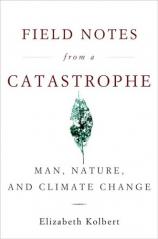Field Notes From a Catastrophe
Review
Field Notes From a Catastrophe
In the movie The Day After Tomorrow, scientists confront
narrow-minded bureaucrats with dire warnings about an impending
climactic crisis. Guess which side prevails?
In FIELD NOTES FROM A CATASTROPHE, Elizabeth Kolbert, a writer for
the New Yorker, presents some equally disturbing, if less
immediate, news.
Kolbert traveled, literally, to the ends of the earth to research
her book, from the poles to the equatorial rainforests. "Global
warming is routinely described as a matter of scientific debate ---
a theory whose validity has yet to be demonstrated," she writes in
a chapter describing how greenhouse gases are melting polar ice
caps.
She notes how most Americans "begin generating CO2 as soon as we
get out of bed," converting everyday activities into the amount of
carbon produced. "Making a pot of coffee, either on an electric or
a gas range, adds…emissions, as does taking a hot shower,
watching the morning news on TV, and driving to work."
The new technologies have increased the need for the energy to
operate them; hotter weather, with the consequent use of air
conditioning, regularly strains power companies. It's a grim
picture.
Unfortunately, many citizens of the world throw up their hands with
one of two philosophies: Either science and industry will come up
with a way to dramatically improve the situation in a relatively
short time, or so much damage has already been done that we're all
doomed, so why not go merrily on our way?
Climactic changes are cyclical. Ancient civilizations have been
wiped out, only to have others take their place. Are we next? When
will it happen? Ten years? Fifty? One hundred or more? Whenever it
occurs, it will be too soon.
"As the effects of global warming become more and more difficult to
ignore, will we react by finally fashioning a global response," she
concludes? (Heck, my town can't agree on a local response to
the recycling issue.) "Or will we retreat into ever narrower and
more destructive forms of self-interest?
"It may seem impossible to imagine that a technologically advanced
society could choose, in essence, to destroy itself, but that is
what we are now in the process of doing."
According to the book's blurb, Kolbert "received the American
Association for the Advancement of Science's magazine writing award
for the New Yorker series on which this book is based." But she
seems to have no other science background to recommend her as an
expert on the subject. She presents her findings from an impressive
array of scientists but borders on losing her audience when the
information comes off as too technical for the layperson to
follow.
As is often the case in matters that pit heart and mind against
those who downplay such warnings because it might hurt their
business or inconvenience them at home, the author ends up
preaching to the choir. Those who are on board have no reason to
read Kolbert's book; those who aren't won't bother either.
Reviewed by Ron Kaplan on January 21, 2011
Field Notes From a Catastrophe
- Publication Date: March 7, 2006
- Genres: Environment, Nonfiction, Politics
- Hardcover: 192 pages
- Publisher: Bloomsbury USA
- ISBN-10: 1596911255
- ISBN-13: 9781596911253




